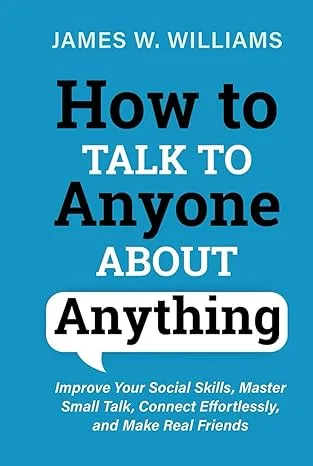About this book
Five Key Takeaways
- Understand yourself to build genuine relationships.
- Practice active listening to foster meaningful connections.
- Ask thoughtful questions for deeper conversations.
- Make a strong first impression to engage others.
- Show enthusiasm to enrich small talk and connections.
-
Understand Your Sense of Self
Before you can build meaningful relationships, you need to understand and define your unique values, beliefs, and identity.
Spend time reflecting on your strengths and flaws through journaling or self-exploration. This awareness helps you engage authentically with others.
When you know yourself, connecting becomes easier because you can articulate your opinions and desires with more confidence.
Developing this clarity isn't a one-time process—it's an ongoing effort that evolves as you grow and gain new experiences.
By doing so, you'll attract connections that resonate with your authentic self and foster genuine, lasting relationships.
Without self-awareness, conversations can feel directionless, and you'll struggle to show confidence during interactions.
Embracing your authentic identity lays the foundation for stronger social skills and more meaningful exchanges with others.
-
Most Fail to Listen Effectively
Active listening is uncommon because many people listen only to respond, not to understand (Chapter 3).
This habit blocks meaningful exchanges and leads to surface-level conversations, preventing deeper connections from forming.
When people fail to listen actively, they miss the emotions and context behind someone's words, weakening communication.
Switching to active listening—using eye contact, open body language, and paraphrasing—builds trust and fosters understanding.
Active listening reshapes relationships by creating an environment where both parties feel heard and respected.
This approach transforms superficial small talk into enriching conversations that leave lasting impressions.
As more people practice active listening, the quality of dialogue and connection in daily interactions significantly improves.
By listening to understand, rather than to react, you can master the foundation of meaningful communication.
-
Minimize Distractions to Listen Better
In today's tech-driven world, even small distractions can block deep conversations and meaningful connections.
Start by locking your phone away, turning off the television, or ensuring noise-free environments when speaking to someone.
This simple practice enhances focus and shows that you're fully present in the interaction.
Distraction-free spaces create trust and value between you and the other person, fostering a stronger bond.
Engaging without interference improves attention spans, aids mutual understanding, and sharpens listening skills.
Failing to minimize distractions conveys disinterest, which risks weakening relationships over time.
By eliminating interruptions, you create a rewarding conversational experience that strengthens personal and professional ties.
-
First Impressions Shape Relationships
Judgments in initial encounters often happen instantly and can set the tone for future interactions.
Many people fail to take control of these moments, leading to missed opportunities or miscommunication.
First impressions influence how you're perceived in important settings like networking events or social calls.
The author believes focusing on body language—smiling, good posture, and appropriate attire—is key to making a positive impact.
This perspective encourages proactive self-presentation rather than leaving first impressions to chance.
Evidence supports the importance of body language in building rapport quickly, which facilitates better connections.
By mastering first impressions, you're more likely to form alliances and relationships that benefit you both personally and professionally.
-
Show Enthusiasm When Speaking
Plain conversations often lack emotional engagement, making them forgettable and unhelpful for forming deeper connections.
Bring more energy to your words by tweaking tone, smiling naturally, and expressing genuine interest in the discussion.
Expressing enthusiasm makes interactions enjoyable, even when discussing mundane topics or casual small talk.
Your passion inspires others to respond more openly, creating two-way conversations that flow naturally.
This approach not only energizes your interactions but also makes you appear more confident and approachable.
Failing to show enthusiasm risks making dialogue feel flat, which can cause disinterest or boredom to creep in.
Practicing focused energy and genuine warmth goes a long way in creating lasting connections and enjoyable exchanges.
-
Act Confident to Build Confidence
Confidence isn’t just innate; it’s something you can develop by intentionally adopting confident actions.
Start your day by practicing power poses or speaking affirmations to yourself in the mirror.
Use bold body language, such as standing tall or maintaining steady eye contact, to project assurance.
These actions trick your brain into feeling confident, creating pathways that reinforce the self-belief over time.
When others perceive you as confident, they’re more likely to engage and respect your opinions.
Failing to practice confidence-building habits might keep you stuck in patterns of self-doubt or hesitation.
By faking confidence initially, you'll learn to embody and feel it authentically in the long run.
-
Everyone Has Stories to Share
Many believe their lives lack the excitement necessary for compelling stories, avoiding storytelling in conversations.
This assumption prevents them from sharing experiences that could create deeper social connections or memorable exchanges.
Stories, no matter how ordinary, hold the power to build emotional bonds by reflecting shared human experiences.
The author champions storytelling as a social skill that turns mundane moments into engaging narratives.
Keeping a journal of small daily events can help you uncover rich storytelling material hidden in your life.
By learning to recognize the power of their own stories, individuals tap into a universal bridge for relating with others.
Tailoring your storytelling to suit your audience can transform bland conversations into emotionally engaging experiences.
-
Build Deep, Meaningful Connections
Shallow social interactions create loneliness, even when you're surrounded by people or active on social media.
Prioritize face-to-face interaction or meaningful calls with a select group of people who bring joy to your life.
Be yourself—authenticity forms the foundation of trust and creates long-lasting, fulfilling friendships.
Deep relationships provide emotional support, boost well-being, and can even lengthen your life.
Failing to invest in meaningful bonds risks mental health issues like loneliness or dissatisfaction in daily life.
Focus on shared experiences and mutual respect, which roots connections in understanding and appreciation.
By fostering genuine relationships, you'll discover more happiness and resilience during life’s ups and downs.




















